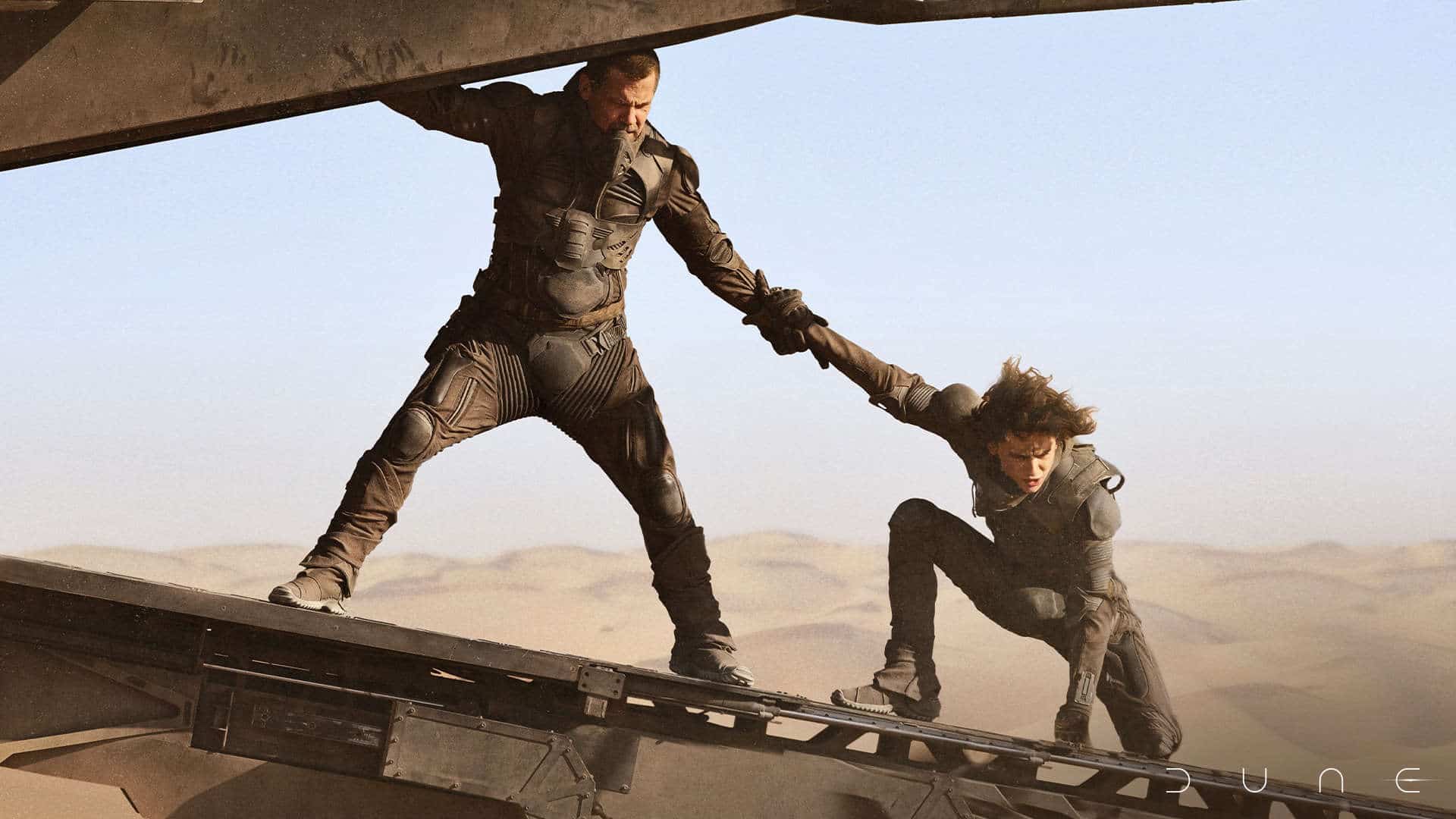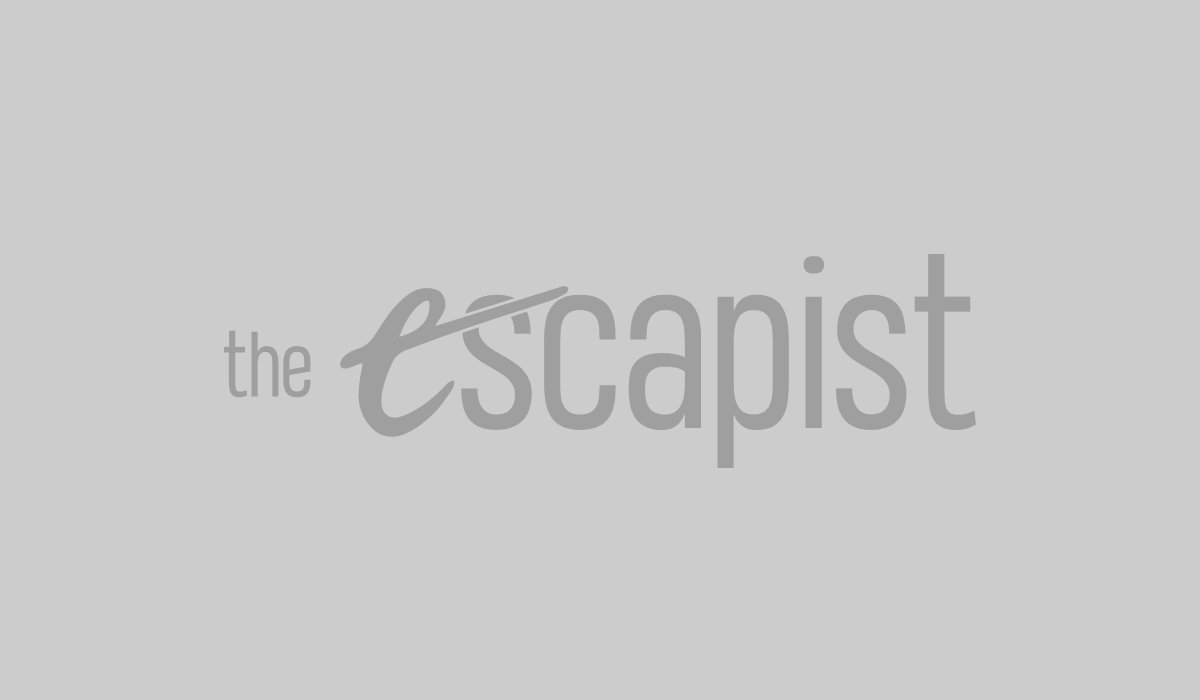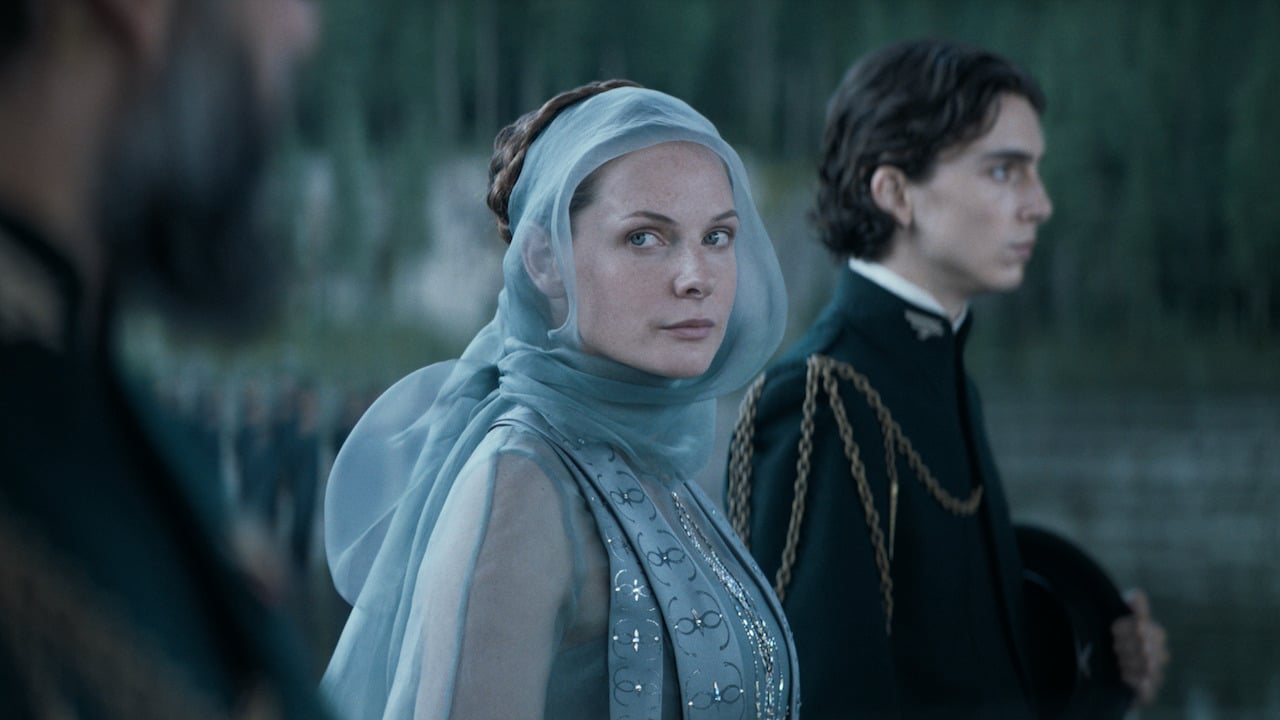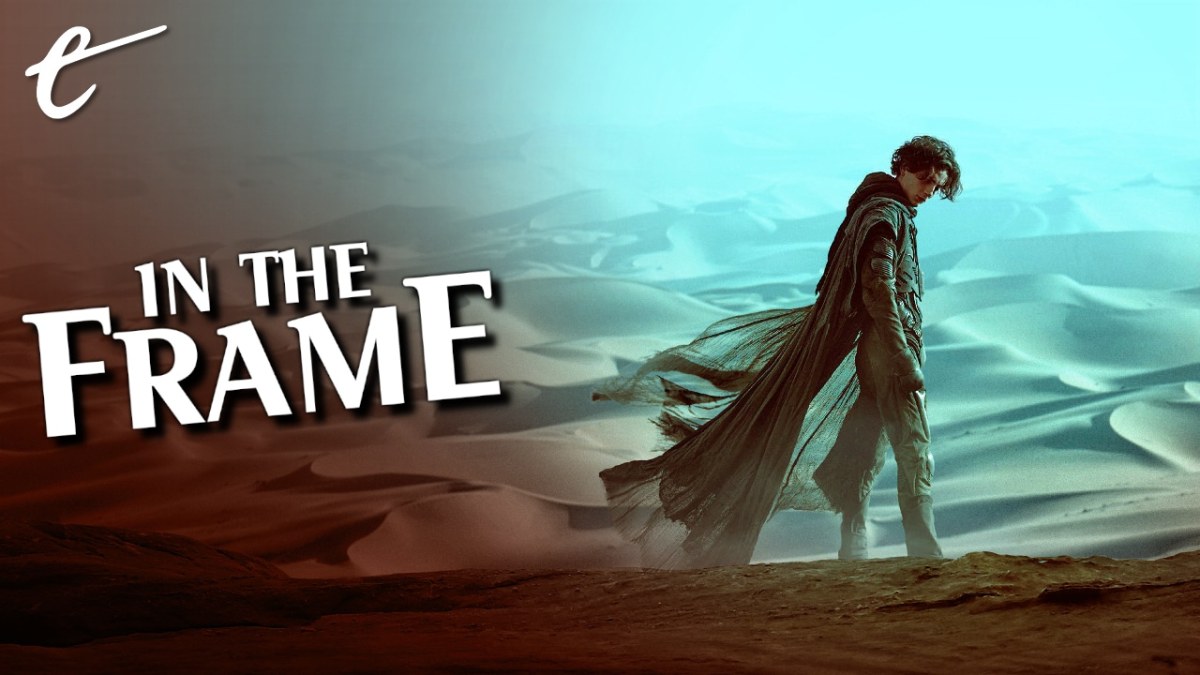Like a lot of science fiction, Denis Villeneuve’s Dune is fundamentally about what makes a person human.
This is largely a result of the structural choice to split the adaptation where they do. There are a lot of rich themes to be found in Frank Herbert’s Dune, but the film adaptation is structured in such a way that, while Dune: Part One seeds them, they only truly come into focus on the (still hypothetical) Dune: Part Two. After all, Paul Atreides’ (Timothée Chalamet) arc has only really begun by the closing credits of the film, with Chani (Zendaya) promising, “This is only the beginning.”
Still, Dune is very much engaged with the question of what it means to be a human being. This makes a certain amount of sense given the film’s setting. Dune is set in a far future where humanity has reverted to a sort of space age feudalism. It is a world of dukes and barons. Personal shields have seen a return to swords and daggers as the primary weapons in person-to-person combat. Lords survey their domains in ceremonial armor. Troop carriers look like floating keeps.
This invocation of medieval iconography is revealing. In Western societies, the modern conception of human rights would not emerge until much later. Even the Magna Carta, often cited as the cornerstone of human rights, only extended procedural protections to barons rather than serfs. The world of Dune operates on a similar premise. Duke Leto Atreides (Oscar Isaac) is presented as an outlier for his promise to “respect the personal dignity of any man who respects (his).”
Many stories that explore what makes a person human often filter the question through the prism of an oppressed underclass. Denis Villeneuve’s previous film, Blade Runner 2049, imagined a future “built on the back of a disposable workforce.” The film focused on K (Ryan Gosling), a synthetic human who was used to hunt other synthetic humans. K was a “skinjob,” treated as inherently lesser than his organic counterparts. The film ultimately finds K proving his own humanity.

Dune inverts this somewhat. The film takes place in a future with a rigid class system, one arguably even more codified than the wall that “separates kind” in Blade Runner 2049. The film is cognizant of the abuse and violence perpetrated in such a society. Chani’s opening narration contextualizes the history of Arrakis as one of colonial oppression. The first shot of Glossu Rabban (Dave Bautista) is the whip that he wears on his waist.
There is, of course, some suggestion of racism within the Imperium towards the planet’s desert-dwelling inhabitants. Paul’s textbook describes them as “dangerous and unreliable.” When Duncan Idaho (Jason Momoa) returns from a diplomatic mission impressed by their technology and culture, his colleague Gurney Halleck (Josh Brolin) jokes that he has “gone native.” Upon reclaiming control of the planet, one of the first edicts of Baron Vladimir Harkonnen (Stellan Skarsgård) is to “kill them all.”
However, the film itself never questions the humanity of this indigenous population. The movie contrasts with earlier adaptations of Dune by giving its opening narration to Chani, rather than Princess Irulan. The native population are the Fremen, a portmanteau of “free men.” They do not live underneath the oppressive boot of the Imperium. The “spice” that can be found in the desert has given the Fremen deep blue eyes — a trait that is often fetishized as a signifier of racial purity.
If Dune accepts the humanity and the dignity of the Freman, it is more skeptical of the ruling class. Early in the movie, Paul is summoned in front of Reverend Mother Gaius Mohiam (Charlotte Rampling) to face the crucible of the gom jabbar. “Like shifting sand through a screen, we sift people,” the Reverend Mother warns Paul. The test is to see whether Paul can override his instincts and resist pain. “An animal caught in a trap will gnaw off its own leg to escape. What will you do?”

Animal imagery recurs throughout Dune, reinforcing this parallel. The imagery is often tied to death. Paul’s visions of Duncan’s death focus on the beetle crawling near his corpse. Much is made of the death of Paul’s grandfather in a bullfight, an event commemorated in engravings and sculptures. The mounted head of that bull is just as prominent as the previous Duke’s portrait. Villeneuve often returns to shots of these statues and the mounted head during the fall of House Atreides.
Then again, Dune is the story of another Duke Atreides mauled and murdered by a wild beast. The Harkonnens are portrayed as inherently animalistic. Rabban is known as “Beast Rabban.” The Baron celebrates his defeat of Leto by gorging himself on food from the palace’s kitchen like an animal. Worried that Paul doesn’t take the threat of the Harkonnen seriously, Gurney warns him, “You’ve never met Harkonnens before. I have. They’re not human. They’re brutal.”
Dune presents a future where the powerful have warped and distorted humanity beyond recognition. This is perhaps most obvious with the spider-like pet that the Baron keeps, a strange black creature that crawls on eight legs that look to end with human hands and still understands human language. However, there are entire classes of people who have been transformed to serve as tools of these power structures, their otherness denoted by physical markers and brands.
Piter De Vries (David Dastmalchian) and Thufir Hawat (Stephen McKinley Henderson) are mentats, human computers with their lips stained by Sapho juice. Dr. Wellington Yueh (Chang Chen) is a graduate of the Suk School, his psychological conditioning denoted with a diamond tattoo on his forehead. The Emperor’s will is enforced by his legions of Sardaukar, deadly soldiers born and bred for combat, identified by the distinctive tattoos above their eyebrows.

Even the technology is animalistic; the ornithopter looks like a dragonfly and the hunter seeker looks like a hummingbird. The world is this way because those in power choose for it to be. “Arrakis could have been a paradise,” explains planetologist Liet-Kynes (Sharon Duncan-Brewster) of the terraforming plans scuppered by the discovery of the spice. So it remained a vast desert home primarily to giant sand worms and small mice, because it is more profitable that way. As Kynes notes, “the desert’s not kind to humans.”
Of course, Frank Herbert’s book goes even further. In contrast to David Lynch’s adaptation of Dune, Villeneuve doesn’t dwell on elements like the Guild Navigators, humans transformed by consumption of the spice to allow them to guide the ships traveling faster than light. Herbert’s series is shaped by the legacy of the Butlerian Jihad, an ancient war against thinking machines that led to the ban on complex computers in the story’s universe. The sequels feature clones and shape-shifters, human bodies further reduced to raw material.
Despite these perversions, Dune is more skeptical of the humanity of its ruling class. Colonial narratives often question the basic dignity of those oppressed, asking the victims to assert their humanity. As much as Dune is accused of peddling in the tropes of those narratives, it inverts this dynamic by challenging the humanity of the oppressors. It wonders if the people shaping this world have lost touch with their basic humanity. The Reverend Mother’s line about traps and animals is revealing, informing much of the plot of Dune.
Those who hold power in Dune are just as liable to end up trapped as those without power. Duke Leto Atreides is a man of great influence, enough to represent a political challenge to the Emperor. He is kind and compassionate. He is a good man. However, he is also trapped by duty and custom, which allows the Emperor to maneuver this potential rival into a trap. The film opens with Leto being gifted control of the planet Arrakis by the Emperor, taking it back from the House Harkonnen.

Leto is introduced accepting that poisoned chalice, assuring his betrayal by the Emperor and the Harkonnens. “There is no call we do not answer, there is no faith that we betray,” he promises to his followers. “The Emperor asks us to bring peace to Arrakis. House Atreides accepts.” Making his official seal, he asks the Herald of the Change (Benjamin Clementine), “So, it’s done?” The Herald responds, “It’s done.” Less than 10 minutes into the film, Leto has sealed his own fate and that of his family.
Leto’s tragedy plays out on a grander scale across the narrative of Dune. The Reverend Mother is a representative of the Bene Gesserit, an order that has spent “thousands of years … carefully crossing bloodlines” to bring forth a messiah that they might control. It is perhaps a most extreme expression of the contempt that this society holds for free will and human rights, treating even the galaxy’s ruling class as little more than breeding stock in their grand design. It is inhuman.
This scheme becomes a trap of itself. Ironically, it is humanity itself that breaks these systems and structures. When Lady Jessica (Rebecca Ferguson) falls in love with Leto, she decides to give him a son rather than the daughter that the Bene Gesserit dictate. Paul’s mere existence is a disruption to the Bene Gesserit breeding plan. That will have horrific consequences, as Paul is granted premonitions of “a war spreading across the universe, like unquenchable fire” in his name.
This is the central tension of Dune — the question of whether Paul is strong enough to break free of the same structures that trapped and murdered his father. Dune positions humanity itself as the only thing strong enough to break these systems of oppression. That’s why it’s important that Paul has to assert his humanity so early in the film. The real question is whether Paul can hold on to that humanity, with all the other forces at work around him and all the traps aligned against him.
At its core, Dune is a cautionary tale about what happens when those in power presume themselves to be more than human, as much as what happens when they assume others are less.





